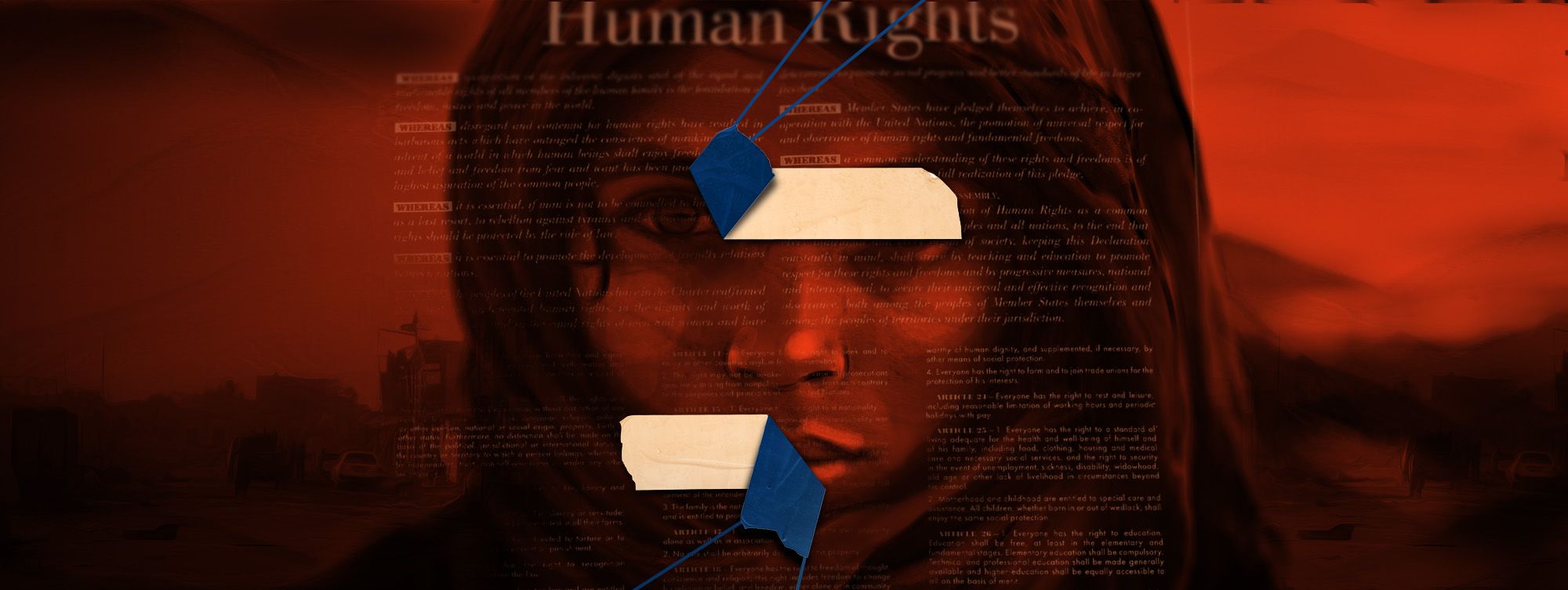|
Getting your Trinity Audio player ready...
|
As the Taliban continues its campaign to rob Afghan women and girls of their rights, U.N. experts and rights advocates have been scrambling to find ways to stop the country’s de facto leaders in their tracks and make them accountable for their dismal treatment of Afghanistan’s female population.
Indeed, there is now a growing international movement to formally define and address “gender apartheid,” which U.N. experts and rights groups say is taking place in Afghanistan.
“The gender apartheid framework complements and can strengthen efforts to prosecute gender persecution at the ICC (International Criminal Court),” argues the non-profit International Service for Human Rights (ISHR). “It offers a more complete description of country situations like Taliban-controlled Afghanistan.”
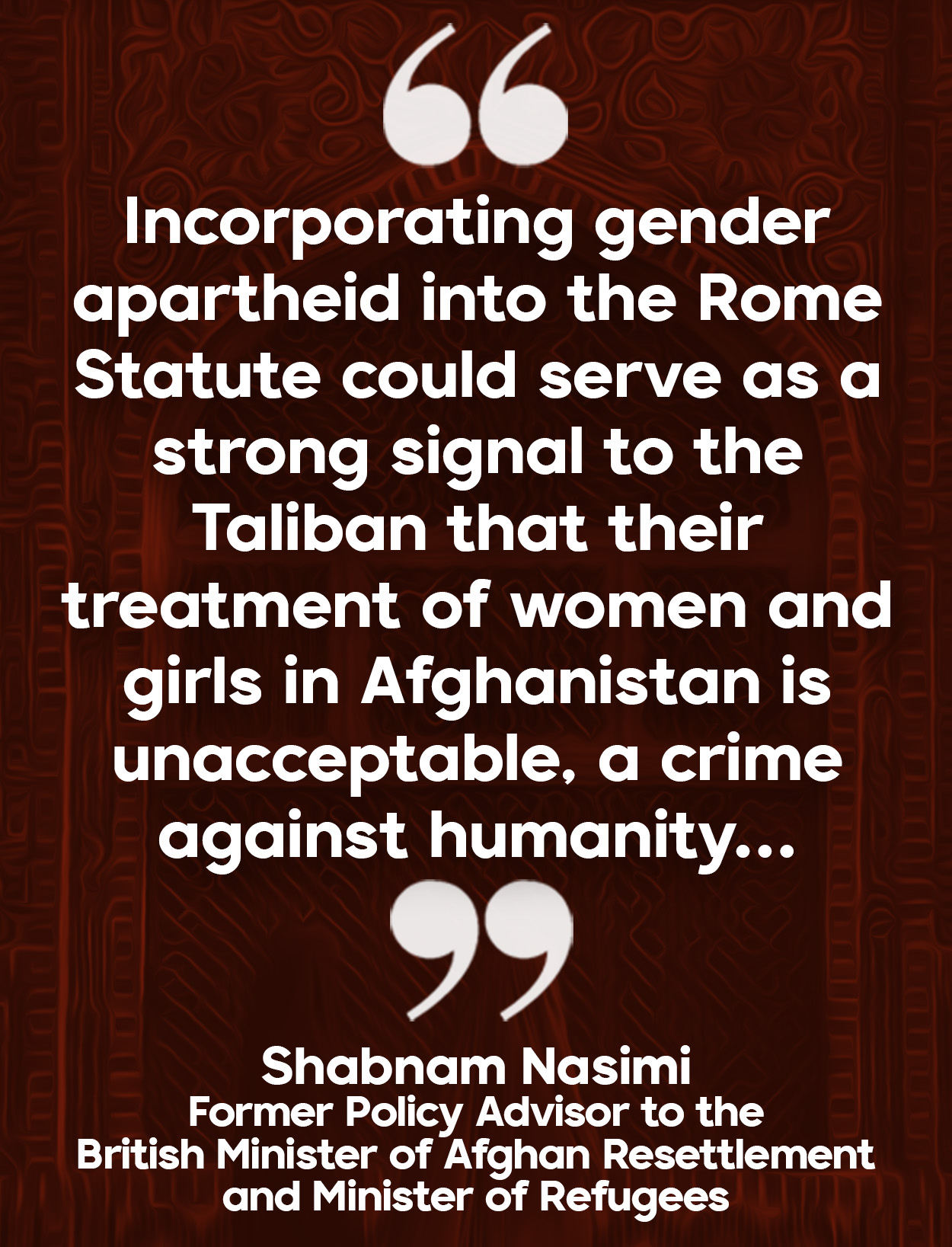 At present, “gender apartheid” is not part of international criminal laws. The phrase, however, has been used since the 1990s to describe the treatment of women and girls in Afghanistan, Saudi Arabia, and Iran. Today, there is a global campaign calling for ending gender apartheid in Iran and Afghanistan, even as rights groups say that it should be made part of the Rome Statute that established the ICC, and used particularly against the Taliban.
At present, “gender apartheid” is not part of international criminal laws. The phrase, however, has been used since the 1990s to describe the treatment of women and girls in Afghanistan, Saudi Arabia, and Iran. Today, there is a global campaign calling for ending gender apartheid in Iran and Afghanistan, even as rights groups say that it should be made part of the Rome Statute that established the ICC, and used particularly against the Taliban.
“Incorporating gender apartheid into the Rome Statute could serve as a strong signal to the Taliban that their treatment of women and girls in Afghanistan is unacceptable, a crime against humanity that warrants attention at the highest levels of international law — something that has been missing for (the last two years) as Afghan women suffered,” says Shabnam Nasimi, former policy advisor to the British Minister of Afghan Resettlement and Minister of Refugees.
As the founder and director of the Conservative Friends of Afghanistan, Nasimi adds that the international community must come together to demand accountability from the Taliban for their continued repression of women.
“It’s unforgivable that we have not been able to capitalize on years of support to guarantee respect for women’s rights in Afghanistan up to this point,” she tells Asia Democracy Chronicles. “It’s imperative that the international community uses all available means to exert pressure on the Taliban regime to honor the rights of women and girls, encompassing their rights to education, employment, and equal involvement in political and societal life.”
Endless restrictions
Following the Taliban’s power takeover in Afghanistan in August 2021, the country’s women and girls have experienced a substantial erosion of their rights and civil liberties. In just two years, the Supreme Leader of the Islamic Emirate of Afghanistan has enacted some 80 edicts, of which 54 specifically target women and girls and aim to erase their rights and civil freedoms.
Afghan women and girls are now banned from acquiring senior secondary and university education, using national parks, venturing outside their homes without a male relative, and working in international NGOs, among other restrictions. Just recently, the Taliban ordered beauty salons shut down and stopped some 100 women from leaving the country to study in the United Arab Emirates on scholarships.
A 17-year-old who had been enjoying her work at a local beauty salon cannot contain her sobs as she tries to answer queries via a phone call. She had to stop schooling at 10th grade after the Taliban came to power, but had consoled herself that even without completing her formal education, she could still help support her family with her work at the salon.
“I was devastated,” says the teenager while trying not to cry. “My mother sold her jewelry for AFN50,000 (USD$635) so I could become a partner in the salon. But now that is closed, too. I don’t know what to do with my life.”
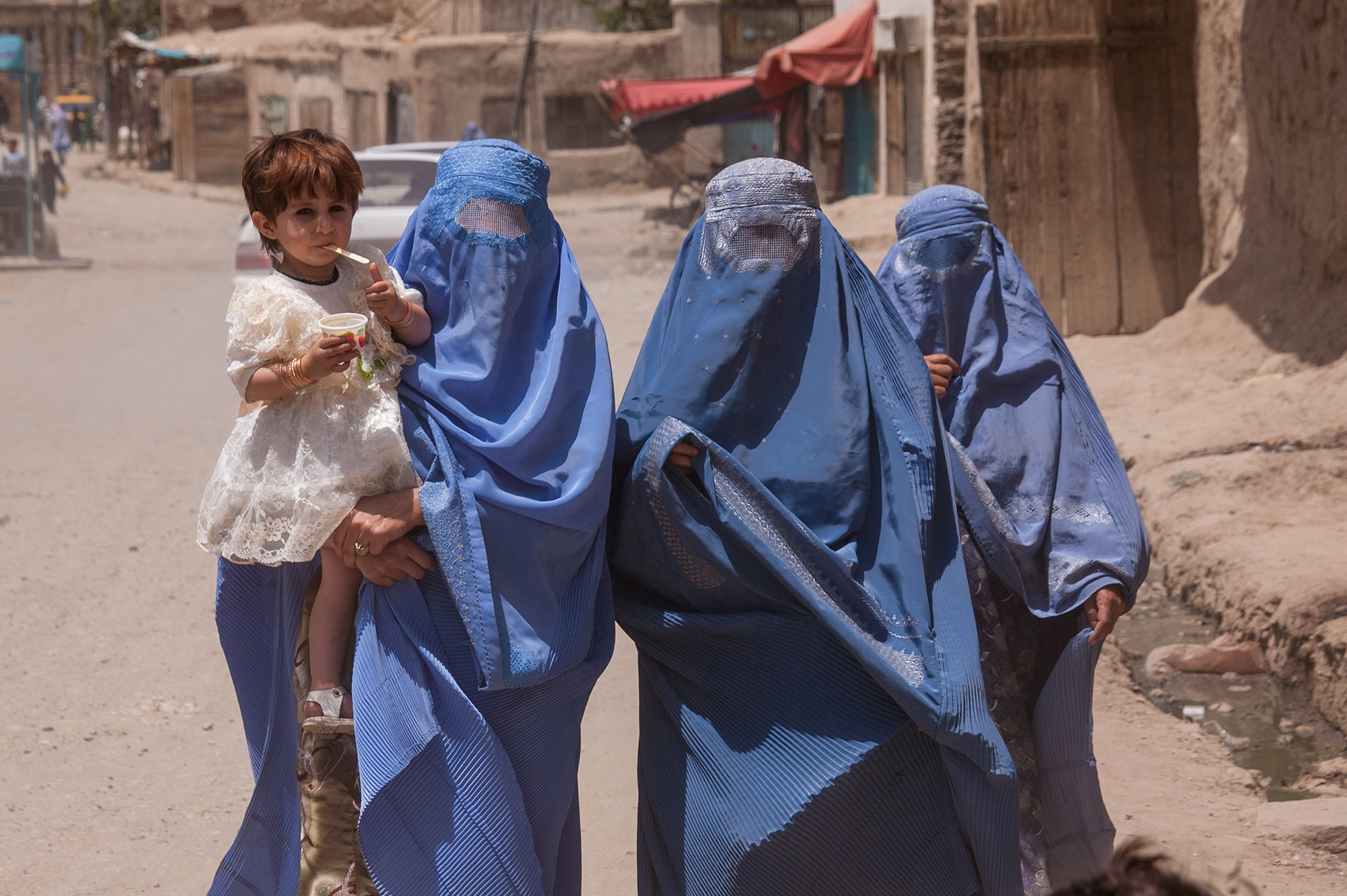
Due to the long-standing bias against women, Afghanistan has a much higher rate of suicide among women compared to that of men: around 80 percent of the country’s suicide cases involve women. Domestic violence in Afghanistan is also among the worst in the world. Unsurprisingly, 47 percent of Afghan women are facing mental health challenges.
Last Sept. 11, Richard Bennett, the UN Special Rapporteur on the state of human rights in Afghanistan, gave an update before the UN Human Rights Council (UNHRC), during which he denounced the Taliban’s “draconian, misogynist policies,” which have led to “the systematic violation of women’s and girls’ human rights that limited every aspect of their lives.”
Earlier, Bennett and Dorothy Estrada-Tanck, chair of the working group on discrimination against women and girls, submitted a joint report to the UNHRC, in which they asserted that the condition of women and girls in Afghanistan was now the most dire worldwide.
The report noted that since assuming power in Afghanistan, the Taliban has suspended the 2004 Constitution and domestic laws, including the Law on the Elimination of Violence against Women. It also dismantled gender equality-promoting institutions like the Afghanistan Independent Human Rights Commission and the Ministry of Women’s Affairs.
At the time of the report, the Taliban was assessing laws for compliance with Sharia law. Considering the group’s past interpretation of Islamic laws, rights advocates worried that these could only mean even more restrictions on women and girls.
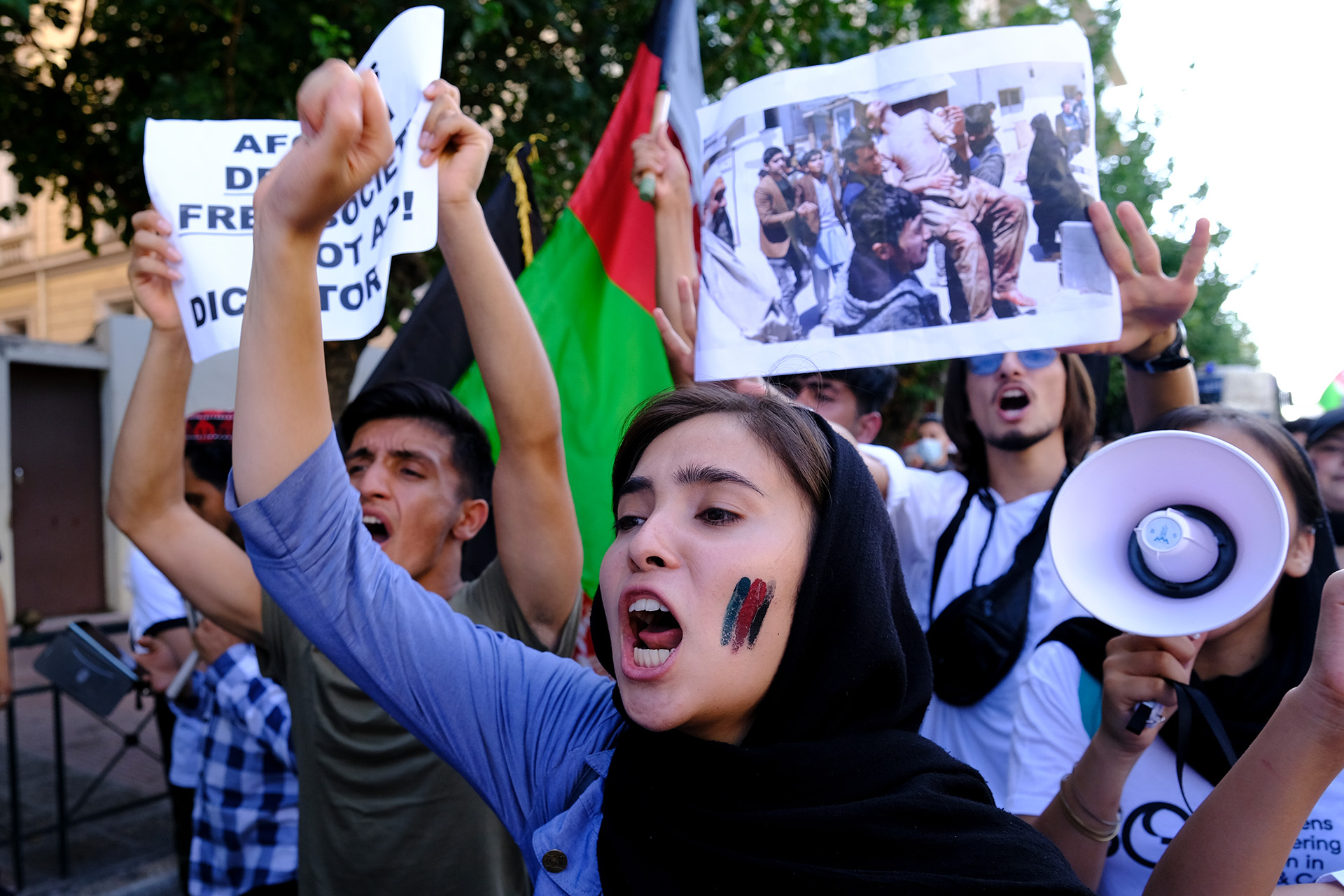
Legal considerations
In their evaluation of the rights situation concerning women and girls in Afghanistan, the Special Rapporteur and the Working Group considered the Universal Declaration of Human Rights along with various human rights treaties, as well as Afghanistan’s status as a state party to the ICC’s Rome Statute.
A report by Amnesty International and the International Commission of Jurists (ICJ) released last May also highlighted the Rome Statute as a way of dealing with the Taliban and its treatment of Afghan women and girls.
In “The Taliban’s war on women: The crime against humanity of gender persecution in Afghanistan,” Amnesty International and ICJ argued that what the Taliban has been doing to the country’s women and girls “could amount to the crime against humanity of gender persecution under Article 7(1)(h)” of the Rome Statute.
A legal opinion commissioned by the ISHR says that “(in) relation to possible prosecution of those responsible for the Taliban’s conduct against women and girls, there is no significant ‘gap’ left by the current international criminalization of persecution on the ground of gender (Rome Statute of the International Criminal Court, Article 7(1)) which could be filled through recognition of a crime of gender apartheid.”
But it also allows that if the Office of the Prosecutor “acts on its intention to treat the crime of persecution on the ground of gender as an area of focus for future prosecutions, it may be that new international jurisprudence will expose ‘gaps’ in the accountability regime. That may present an appropriate opportunity to revisit the question of whether it would be advantageous to recognize a new crime of gender apartheid, or to advocate for an amendment to the existing crime in Article 7(1)(h), that could address any such gap.”
ISHR, though, is convinced that gender apartheid more aptly describes what is being done to Afghan women and girls. On its website, it says, “The gender apartheid framework complements and can strengthen efforts to prosecute gender persecution at the ICC.”
According to ISHR, gender persecution “(like) any crime against humanity … occurs within the context of a widespread or systematic attack against a civilian population when there is a ‘policy to commit such attack.’” But it noted that “unlike other crimes against humanity, persecution requires an additional threshold” and “must happen ‘in connection with any act referred to in this paragraph or any crime within the jurisdiction of the Court.’”
ISHR adds that “the definition of apartheid in Article 7(2)(h) much more fully captures situations like Taliban Afghanistan if one substitutes ‘gender’ for ‘race’ in the following passage: ‘inhumane acts … committed in the context of an institutionalized regime of systematic oppression and domination by one [gender] group over any other [gender] group or groups and committed with the intention of maintaining that regime’.”
“This underscores that domination of women is a core element of the group’s ideology and of its governance,” says the rights group. “Hence, the apartheid framework recognizes that systemic and institutional positive change will only be possible with a consistent, concerted, principled international response.”
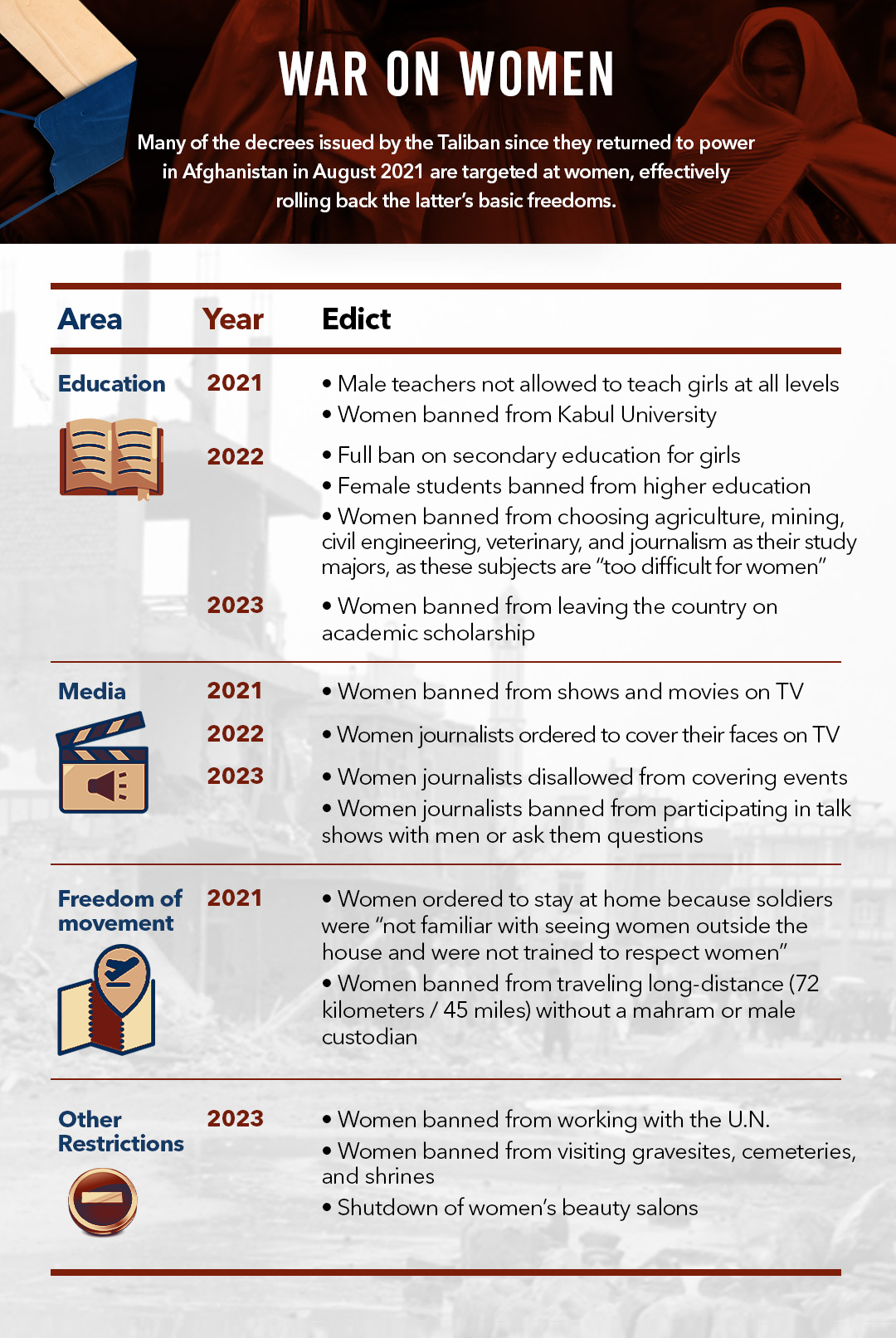
No magic formula
In a recent international meeting, reported the non-profit group Counterpart International, University of Michigan law professor Karima Bennoune said the “inclusion of gender apartheid in international legal frameworks is not the solution itself … but rather it would provide the tools for the international community to act, drawing comparisons to how the apartheid system was dismantled in South Africa, thanks to a global movement that brought attention to the atrocities that were committed.”
Bennoune, who wrote an influential paper on gender apartheid in Afghanistan, said in an interview that “ultimately, what matters most is not that people say these ‘magic words,’ gender apartheid; what matters most is that states and other actors effectively fulfill all the legal obligations that come with using the apartheid framework, which is the requirement to take concerted, effective action to end an illegal situation.”
Zahra Nader, chief editor of Zan Times, a London-based media outlet covering rights violations in Afghanistan, laments that the ever-expanding restrictions on women and girls in Afghanistan could only affect Afghan society negatively.
“Five to 10 years down the road, we don’t have women who get education, we don’t have doctors, we don’t have teachers,” she says. “We don’t have educated women who are able to read and write or guide their children to make better choices in life. So there’s going to be a lot of problems and most of them will be long-lasting because a generation of people will be affected by the decision of the Taliban who are building this gender apartheid in Afghanistan.”
Nader also points out that Afghan women have been isolated from the outside world due to restrictions on women journalists. Because of these rules, she says, Afghan women are unable to freely communicate and share experiences with millions of other women elsewhere. Afghan journalist Sofia Hamid says it’s almost impossible now to write about topics related to women.
“We are no longer allowed to report on women’s issues in Afghanistan, like the challenges they are facing or the protests,” says Hamid. “People say we have lost a lot in two years. No, we lost everything in one night. The night before the Taliban came to Kabul was the last time we were free.” ◉
Kanika Gupta is a journalist from New Delhi who is currently based in Berlin, Germany to pursue her master’s degree in Documentary Filmmaking. She reports on human rights from conflict regions like Afghanistan and Kashmir.










